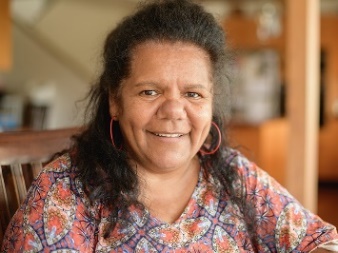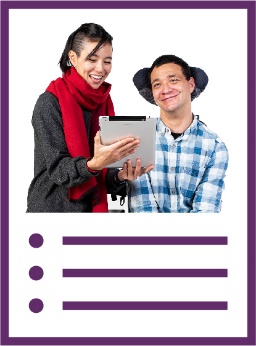Getting ready to talk to your worker
| It’s a good idea to think about what you want to say to your worker before you talk to them. |
You can: | |
|
|
|
|
| You can think about the questions below. |
| How do you want to talk to your worker? For example, over the phone. | |
| What do you need to talk to them? For example, a friend to support you. | |
| Do you know who to contact if you have a problem with your worker? Do you know how to contact them? For example, your service provider. | |
| Is there anyone else who might be part of the relationship between you and your worker? For example, someone who helps you manage your NDIS plan. | |
Building trust
| It’s a good idea to build trust between you and your worker. |
| You can think about the questions below. |
| Are there other people that your worker should know about? Or who they might work with? For example, other support workers. |
| Have you both agreed on the kinds of information you are happy for your worker to:
|
| We created 2 examples of how these questions could help you build trust between you and your worker. |
| Example 1: Effie is a person with disability. She explained to her worker and service provider that her privacy is very important to her. |
| Privacy means people must keep your information:
|
| Effie’s service provider worked with her to respect her privacy and keep her information safe. |
| They agreed on the information her worker needed. As well as who her worker could share that information with. |
| Example 2: Nam wanted his workers to work as a team. So he asked if each worker was okay with sharing their phone numbers with each other. They agreed to share their phone numbers. |
| Nam also explained he was comfortable for them to share information about his health with:
He told them to ask him if they needed to tell someone else about his health. |
| You can learn more about building a relationship of trust with your worker on our website. workforcecapability.ndiscommission.gov.au/ framework/level#gen_ourRelationship_0_0 |
Making sure your worker respects you
| It’s important to make sure your workers respect:
| |
| Your culture is:
| |
| For example, you might be an Aboriginal or Torres Strait Islander person. | |
| Or you might be culturally and linguistically diverse (CALD). CALD people:
| |
| You might also be LGBTIQA+. The letters LGBTIQA stand for lesbian, gay, bisexual, transgender, intersex, queer or questioning and asexual. The ‘+’ is for people who are part of the LGBTIQA+ community but don’t talk about themselves using a word from this list. | |
| We made the NDIS Workforce Capability Framework. It helps to explain what skills and attitudes a worker needs to respect:
| |
| Your attitudes are what you think, feel and believe. | |
| You can learn more about making sure your worker respects you and your culture on our website. workforcecapability.ndiscommission.gov.au/ framework/level#gen_ourRelationship_0_0 | |
Getting ready to talk to your worker
| It’s a good idea to think about what you want to say to your worker before you talk to them. |
You can: | |
|
|
|
|
| You can think about the questions below. |
| How do you want to talk to your worker? For example, over the phone. | |
| What do you need to talk to them? For example, a friend to support you. | |
| Do you know who to contact if you have a problem with your worker? Do you know how to contact them? For example, your service provider. | |
| Is there anyone else who might be part of the relationship between you and your worker? For example, someone who helps you manage your NDIS plan. | |
Building trust
| It’s a good idea to build trust between you and your worker. |
| You can think about the questions below. |
| Are there other people that your worker should know about? Or who they might work with? For example, other support workers. |
| Have you both agreed on the kinds of information you are happy for your worker to:
|
| We created 2 examples of how these questions could help you build trust between you and your worker. |
| Example 1: Effie is a person with disability. She explained to her worker and service provider that her privacy is very important to her. |
| Privacy means people must keep your information:
|
| Effie’s service provider worked with her to respect her privacy and keep her information safe. |
| They agreed on the information her worker needed. As well as who her worker could share that information with. |
| Example 2: Nam wanted his workers to work as a team. So he asked if each worker was okay with sharing their phone numbers with each other. They agreed to share their phone numbers. |
| Nam also explained he was comfortable for them to share information about his health with:
He told them to ask him if they needed to tell someone else about his health. |
| You can learn more about building a relationship of trust with your worker on our website. workforcecapability.ndiscommission.gov.au/ framework/level#gen_ourRelationship_0_0 |
Making sure your worker respects you
| It’s important to make sure your workers respect:
| |
| Your culture is:
| |
| For example, you might be an Aboriginal or Torres Strait Islander person. | |
| Or you might be culturally and linguistically diverse (CALD). CALD people:
| |
| You might also be LGBTIQA+. The letters LGBTIQA stand for lesbian, gay, bisexual, transgender, intersex, queer or questioning and asexual. The ‘+’ is for people who are part of the LGBTIQA+ community but don’t talk about themselves using a word from this list. | |
| We made the NDIS Workforce Capability Framework. It helps to explain what skills and attitudes a worker needs to respect:
| |
| Your attitudes are what you think, feel and believe. | |
| You can learn more about making sure your worker respects you and your culture on our website. workforcecapability.ndiscommission.gov.au/ framework/level#gen_ourRelationship_0_0 | |



























